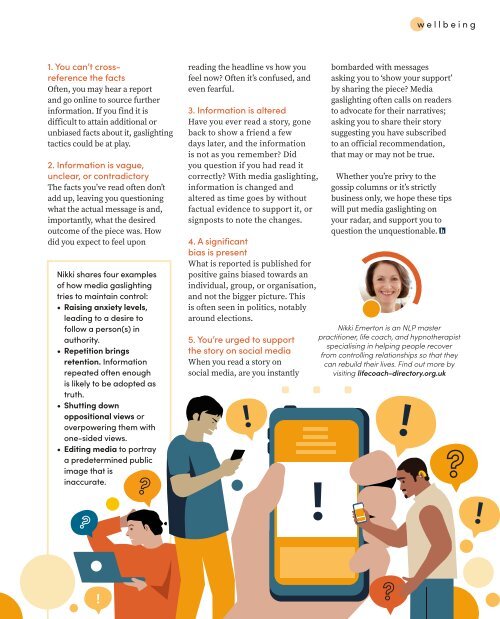Create successful ePaper yourself
Turn your PDF publications into a flip-book with our unique Google optimized e-Paper software.
wellbeing<br />
1. You can’t crossreference<br />
the facts<br />
Often, you may hear a report<br />
and go online to source further<br />
information. If you find it is<br />
difficult to attain additional or<br />
unbiased facts about it, gaslighting<br />
tactics could be at play.<br />
2. Information is vague,<br />
unclear, or contradictory<br />
The facts you’ve read often don’t<br />
add up, leaving you questioning<br />
what the actual message is and,<br />
importantly, what the desired<br />
outcome of the piece was. How<br />
did you expect to feel upon<br />
Nikki shares four examples<br />
of how media gaslighting<br />
tries to maintain control:<br />
• Raising anxiety levels,<br />
leading to a desire to<br />
follow a person(s) in<br />
authority.<br />
• Repetition brings<br />
retention. Information<br />
repeated often enough<br />
is likely to be adopted as<br />
truth.<br />
• Shutting down<br />
oppositional views or<br />
overpowering them with<br />
one-sided views.<br />
• Editing media to portray<br />
a predetermined public<br />
image that is<br />
inaccurate.<br />
reading the headline vs how you<br />
feel now? Often it’s confused, and<br />
even fearful.<br />
3. Information is altered<br />
Have you ever read a story, gone<br />
back to show a friend a few<br />
days later, and the information<br />
is not as you remember? Did<br />
you question if you had read it<br />
correctly? With media gaslighting,<br />
information is changed and<br />
altered as time goes by without<br />
factual evidence to support it, or<br />
signposts to note the changes.<br />
4. A significant<br />
bias is present<br />
What is reported is published for<br />
positive gains biased towards an<br />
individual, group, or organisation,<br />
and not the bigger picture. This<br />
is often seen in politics, notably<br />
around elections.<br />
5. You’re urged to support<br />
the story on social media<br />
When you read a story on<br />
social media, are you instantly<br />
bombarded with messages<br />
asking you to ‘show your support’<br />
by sharing the piece? Media<br />
gaslighting often calls on readers<br />
to advocate for their narratives;<br />
asking you to share their story<br />
suggesting you have subscribed<br />
to an official recommendation,<br />
that may or may not be true.<br />
Whether you’re privy to the<br />
gossip columns or it’s strictly<br />
business only, we hope these tips<br />
will put media gaslighting on<br />
your radar, and support you to<br />
question the unquestionable.<br />
Nikki Emerton is an NLP master<br />
practitioner, life coach, and hypnotherapist<br />
specialising in helping people recover<br />
from controlling relationships so that they<br />
can rebuild their lives. Find out more by<br />
visiting lifecoach-directory.org.uk

















